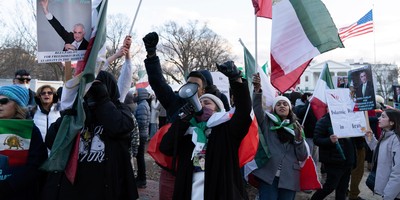Are the French getting their Tea Party on? That's what an outsider looking at the country's first-round presidential voting results might have been led to believe. But, as with many things French, the reality is très compliquée.
The weekend vote knocked out all but the two candidates long expected to square off in the May 6 final: Socialist Francois Hollande (28.6 percent) and incumbent center-right President Nicolas Sarkozy (27.2 percent). This isn't the story, though. The most striking news is the 17.9 percent score by Marine Le Pen's National Front party. That's even better than her father Jean-Marie's best showing of 16.9 percent when he shockingly knocked out the Socialist candidate in the first round of the 2002 race to face incumbent President Jacques Chirac in the final.
What's behind Le Pen's surprising showing? What sentiment is she capturing, exactly? Who are her supporters?
Let's widen the picture a bit to get a better understanding.
Last week, I debated on Russian television the topic of extremism in Europe within the context of the Anders Breivik case currently being adjudicated in Norway. Last summer, Breivik killed dozens of people at a youth camp linked to Norway's left-leaning Labor Party, which he holds responsible for pro-Muslim immigration policies. One of my debate opponents argued that Breivik represents some kind of worrisome Western trend -- from the rising popularity of "far-right" parties in Europe to the American Tea Party movement.
Recommended
Aside from the fact that Breivik never had the Tea Party on speed dial, I pointed out that we shouldn't confuse legitimate and vigorous criticism of current political initiatives with the violent acts of a single behavioral outlier.
If one were to make the same kind of sweeping judgment about violent non-Western fanatics, despite the prevalence of a clear perpetrator profile pattern, that person would be chastised and admonished, if not censored or sued. Yet some are all too willing to portray a person or group with a thoughtful right-wing view as being on the verge of snapping -- usually a means of discrediting a rational argument, even before its merits can be thoroughly assessed.
It's precisely this attempt to marginalize people who don't adhere to the increasingly prevalent culturally Marxist views that drives them to seek out and support democratic entities (like Le Pen's National Front party) that accord them a proper public voice. That's how it's done in civil societies. Where's the alarmism in that? If dialogue around these issues is quashed or marginalized, the parties championing these concerns will serve as pressure valves and grow in popularity. This partly explains the National Front's record electoral figure -- but it's not the whole story.
It would be a mistake to think that the "far right" in France stands for limited government and a free market. The National Front rails against decentralization, advocates a strong federal government, and complains that European legislation forces competitive trade and prevents the French government from financially assisting companies, thereby inhibiting "economic patriotism."
Sounds more like Russia than the Tea Party, doesn't it? Under the National Front's political tent, one finds a political buffet consisting of far more than just a righteous battle against cultural Marxism and population replacement. There's something for nationalists, socialists, protectionists and anti-elitists -- everything but a significant helping of free market and limited government.
When Le Pen denounces Sarkozy's "ultra-liberalism," she isn't talking about leftism. In Europe, "liberalism" isn't synonymous with "leftism" as it is in America. Rather, it refers to the kind of classical liberalism prevalent in 19th century America and incarnated by the likes of right-libertarian heroes Milton Friedman and Friedrich Hayek. As a free-market, limited-government conservative who once served as a Republican think-tank director, I'm typically considered a "liberal" in France.
So, how many people within Le Pen's party adhere to politics similar enough to mine that they'll vote for Sarkozy in the final round? Based on various analyses, I'd wager no more than about half, with the rest supporting the Socialist. One might even argue that because former Trotskyite Jean Luc Mélenchon did worse than expected and the Socialist scored precisely as expected, Le Pen's "far right" party scooped up some nanny-state Communists in the first round. (Try reading that last sentence again without your brain exploding.)
Blaise Pascal once said, in adapting a famous Montesquieu quote, "Truth on one side of the Pyrenees is error on the other." It's a fitting adage as Americans try to make sense of the politics at play behind this dramatic French electoral spectacle.
























Join the conversation as a VIP Member